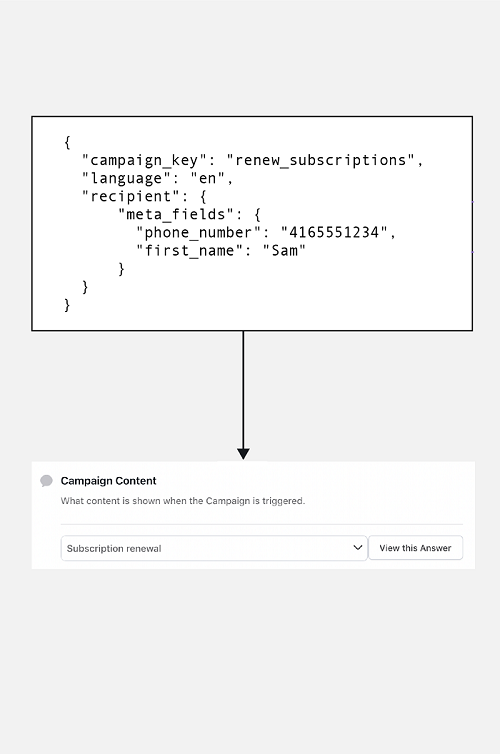
| Email Address sales@sprintsmsservice.com |
Destination For Your Business Goal

| |
What is an API
API stands for Application Programming Interface. An API is a set of protocols, routines, and tools that developers use to build software applications. APIs provide a standardized way for different software systems to interact with each other, allowing them to exchange data and services seamlessly. APIs can be used to enable communication between different components of a single software application or between multiple applications across different platforms and devices. APIs work by defining a set of rules and formats for exchanging information between different software components. Developers can use APIs to integrate third-party services, such as payment gateways, social media platforms, and messaging services, into their applications, allowing them to offer more features and functionality to their users. APIs can be accessed through various methods, such as web-based APIs that use HTTP requests to retrieve or manipulate data, or client libraries that provide programming language-specific functions for interacting with the API. APIs are widely used in web and mobile application development, as well as in various industries such as finance, healthcare, and e-commerce.
Standardized communication
APIs provide a standardized way for different software components and applications to communicate with each other, using a common set of rules for exchanging data and services.
Integration and extensibility
APIs enable developers to integrate third-party services and functionalities into their applications, allowing them to extend the capabilities of their software and offer more value to their users.
Widely used and versatile
APIs are widely used in various industries and application domains, from finance, healthcare, to e-commerce. APIs can be accessed through various methods making them versatile.
Enable Your Applications with SMS in Minutes

Personalized Messaging
Flexible personalized messaging with editable fields for you to send SMS conviniently.
.png)
Language-Based Messaging
Create a customized message in your preferred language and send it in unicode.
.png)
Two-Factor Authentication
Secure your applications at scale by sending dynamic verification codes.

Scheduling & Group SMS
Strategically manage your marketing based on the preferences.

Global and Instant Delivery
Send your SMS all across the globe hassle-free and instantly.

Multiple Interface Options
Choose how to send a message using our SMS Panel, API or SMPP.
SMS API can be considered safe if proper security measures and protocols are implemented. Here are three pointers that show the safety features of SMS API:
Encryption
Encryption is one of the key security features of SMS API. It ensures that the data being transmitted between different software components is protected from unauthorized access, interception, or modification. APIs should use industry-standard encryption algorithms, such as SSL or TLS, to encrypt data in transit and protect sensitive information.
Authentication and authorization
SMS API should also implement strong authentication and authorization mechanisms to ensure that only authorized users and applications can access and use the API. This can be achieved through methods such as API keys, OAuth tokens, or multi-factor authentication, which help to verify the identity of the user or application and prevent unauthorized access.
Compliance and auditing
SMS API should comply with relevant industry standards, regulations, and best practices, such as PCI DSS, HIPAA, or GDPR, to ensure that the API is secure and compliant with data protection laws. Regular auditing and monitoring of the API usage can help identify potential security vulnerabilities or incidents and take appropriate actions to mitigate them.
6 Types of SMS API
Java SMS API
Java SMS API is a set of programming tools and libraries that developers can use to build SMS messaging applications in Java. Java SMS API supports various protocols such as SMPP, HTTP, and FTP, and is widely used in enterprise-level messaging applications.
Python SMS API
Python SMS API is a set of programming tools and libraries that developers can use to build SMS messaging applications in Python. Python SMS API supports various protocols such as SMPP, HTTP, and FTP, and is popular for its ease of use and readability.
PHP SMS API
PHP SMS API is a set of programming tools and libraries that developers can use to build SMS messaging applications in PHP. PHP SMS API supports various protocols such as SMPP, HTTP, and FTP, and is widely used in web development.
Ruby SMS API
Ruby SMS API is a set of programming tools and libraries that developers can use to build SMS messaging applications in Ruby. Ruby SMS API supports various protocols such as SMPP, HTTP, and FTP, and is popular for its simplicity and expressiveness.
.NET SMS API
.NET SMS API is a set of programming tools and libraries that developers can use to build SMS messaging applications in .NET languages such as C# and Visual Basic. .NET SMS API supports various protocols such as SMPP, HTTP, and FTP.
Node.js SMS API
Node.js SMS API is a set of programming tools and libraries that developers can use to build SMS messaging applications in Node.js, a popular JavaScript runtime. Node.js SMS API supports various protocols and is known for its speed and scalability.
3 use case of SMS API
SMS APIs are commonly used by businesses and organizations for a variety of purposes. One popular use case is marketing and promotions, where SMS messages are used to send marketing campaigns, special offers, and event reminders to customers. Another use case is authentication and security, where SMS messages are used for two-factor authentication to help prevent unauthorized access and reduce the risk of fraud. Finally, SMS APIs are also used for notifications and alerts, such as appointment reminders, payment confirmations, and delivery notifications, to improve communication and enhance the overall customer experience.
Marketing and promotions
SMS APIs are commonly used by businesses to send promotional messages to their customers. This can include marketing campaigns, special offers, and reminders about upcoming events or promotions. It is a boon in disguise for small and medium enterprise.
Authentication and security
SMS APIs can be used for two-factor authentication, which adds an extra layer of security to the login process by requiring users to enter a code that is sent to their mobile phone via SMS. This can help prevent unauthorized access and reduce the risk of fraud.
Notifications and alerts
SMS APIs can be used to send notifications and alerts to customers or employees, such as appointment reminders, payment confirmations, or delivery notifications. This can help improve communication and reduce the risk of missed appointments or deadlines.
4 Myths related to SMS API
Myth 1
SMS APIs are difficult to integrate with existing systems. In reality, most SMS APIs are designed to be easy to integrate with existing systems, and many providers offer extensive documentation and support to help developers get started.
Myth 2
SMS APIs are only for large organizations. While SMS APIs are certainly useful for large organizations with a large customer base, they can also be beneficial for smaller businesses or organizations that need to communicate with customers or employees quickly and reliably.
Myth 3
SMS APIs are expensive. While some SMS API providers may charge high fees, there are many providers that offer affordable pricing plans and flexible payment options, making SMS APIs accessible to businesses and organizations of all sizes.
Myth 4
SMS APIs are not secure. In reality, most SMS APIs use encryption and other security measures to ensure the confidentiality and integrity of messages sent over the API. Additionally, many SMS API providers offer additional security features such as two-factor authentication to further enhance security.
